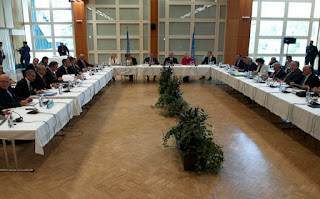Time for Closure in Cyprus: Keeping the Faith
With the start of the new round of talks in Crans
Montana on 28 June regarding the future of Cyprus, all the bets are on as to
whether these will lead to a deal or be another part in a long process of
reconciliation but not enough to cross the finish line. Although the momentum
that was evident at the beginning of the year has significantly stalled, the United
Nations through its good offices has managed to get the leaders of the Greek
and Turkish Cypriot communities, the representatives of the three guarantor powers
– Greece, Turkey, and the United Kingdom, and the representative of the
interested party – the European Union, to return to the negotiating table.
The stakes are a historic deal in the making
and the implications of a non-deal should the talks fail to yield positive
results with the chances evenly divided for either outcome to prevail.
The optimistic scenario stems from the fact
that the leaders of the two communities – Nicos Anastasiades and Mustafa Akinci -- have shown a remarkable degree of resilience albeit a number of setbacks
that have injured their trust in each other but have failed to deter their
faith in the possibility of a deal. In fact, most of the governance issues, the
property issues, and the questions of missing persons are close to closure.
This faith in the process has been helped significantly by the involvement and
support of the growing and committed pro-solution civil society in both
communities. Ever since the first opening of a crossing across the Green Line
in April 2003 after nearly 30 years, and the subsequent opening of a number of
crossings hence allowing Turkish Cypriots to visit the South and Greek Cypriots
to visit the North, the number of pro-solution supporters across the divide has
grown significantly. Civil society now plays a significant role in a number of
the Technical Committees that have been established underpinning the attempts
at political negotiation. These include, inter alia, the technical committees
on gender equality, on environment, on cultural heritage, on border crossings,
on education. The participation of a number of committed individuals from both
communities in each committee working together to make proposals that the
negotiators can work with has led to an ownership of the whole process where unlike
the Annan Plan of 2004, the current agreement that is to be negotiated and
drafted will be exclusively the product of the two sides, not the international
community.
The civil society support and input has helped
the negotiators keep the faith and overcome the possible lack of trust. It also
sends a clear message to the guarantor powers that it would be hard for them to
interfere in the formulas the two communities agree to. Civil society
involvement has also led to the growing acceptance of widening the conception
of security guarantees, as being primarily based on the number of troops the
guarantor powers would like to maintain in the island as part of the deal, to a
wider notion of human security where security is perceived in a more holistic
fashion where issues such as the fate of the environment and climate change,
the state of the economy, and gender equality are just as important notions of
security. The presence of the European Union as an interested party in the
process is also relevant given the fact that the Republic of Cyprus is a member
state of the EU and that Turkish Cypriots are also considered citizens of the Union. In other words, whatever the final shape of the
deal, united Cyprus will be part of the European Union.
The presence of the European Union and its
declared intention to help in particular in the implementation of the deal when
reached possibly provides political impetus to Turkey’s stalled relations with
the European Union. In other words, should a solution be found in the pressing
issues of security and guarantees with the consent of the three guarantor
powers, Ankara could jumpstart its political ties with the European Union and
provide new dynamism in the accession process or other areas of cooperation
between the two sides. The stated intent of both Athens and Ankara to be
constructive is hopeful.
Should the talks, which could last for as much
as two weeks, stall or break down, it might be wise to find a mechanism to
consolidate the points of accord and maybe even consider their implementation
before a solution is found on all outstanding issues as the possibility of
failure to advance further remains a strong possibility.
In other words, the parties should focus on
keeping the faith in the process and bring to closure this decades-long
conflict whose resolution would significantly impact positively on the
bilateral relations between Greece and Turkey. This in itself in worth keeping
the faith.





Comments